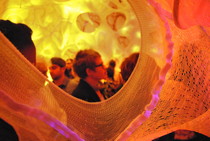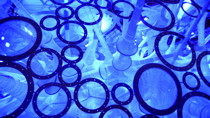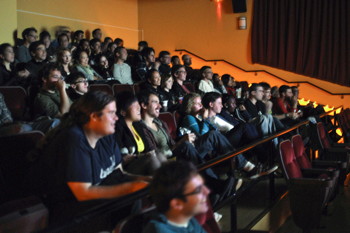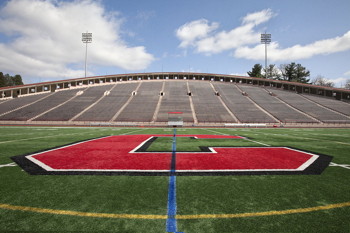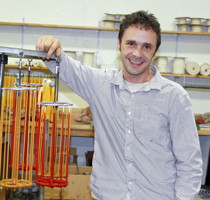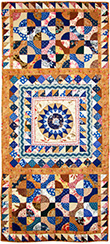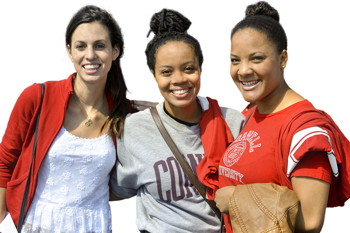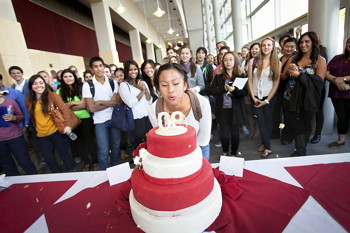THE ESSENTIALS
WILD IDEASPavilion of threads
Can a building be constructed from thread? Assistant professor of architecture Jenny Sabin demonstrated the potential of soft textile-based architecture with a pavilion she designed using photo-luminescent, solar-active and reflective threads, which was open to the public in New York City from September through early November.
The project was commissioned by Nike Inc. as part of the release of its Flyknit Collection, a new technology that uses machine-knitted fabric and eliminates many toxic glues from the manufacturing process. To showcase its new line of footwear, Nike launched an initiative called the Flyknit Collective and selected six architects, designers and artists to create works inspired by the product's design. Besides New York City, the projects were located in Shanghai, London, Milan, Rio de Janeiro and Tokyo.
"Even though Nike is working at the scale of a shoe, the same principles apply at the scale of a building, and that's what I'm interested in probing," Sabin says. "I'm interested in how the simplicity of knitting is coupled with the dynamics and complexity of the human body."
The architect who designed the project for Shanghai, Arthur Huang, B.Arch. '01, is the co-founder and managing director of Miniwiz, a Taiwanese company that incorporates recycled materials into buildings and consumer products.
200 thumbs up
Flicstart, www.flicstart.com, empowers movie lovers to order screenings of nearly any content at any movie theater, provided enough people join the request in advance. Content can also include music, sports and arts on the big screen.
The startup is a collaboration among Jeff Cloetingh '12 (Johnson), Andrew Schoen '12 (Arts & Sciences) and Paul Heran Yang '12, M.Eng. '13 (Engineering). Cloetingh worked on the business plan for Flicstart with Schoen for a Johnson course, where it won the Hemmeter Award as most likely to launch a successful business; Schoen and Yang met at a Cornell entrepreneurship "boot camp."
Cloetingh notes that movie theaters on average fill only 15 percent of movie theater seats. Flicstart users pick a time, movie and theater; if enough people sign up, the event is on.
The concept was given a test run in September at Ithaca's Cinemapolis with a screening of the cult film "The Room." "Flicstart empowered over 100 people to see a cult classic film on the big screen at Cinemapolis. It was wildly successful, amazingly energetic and very well received by the theater," Cloetingh said.
Athletic Hall of Fame
Eleven new members, including seven All-Americans, were inducted into the Cornell University Athletic Hall of Fame at the 36th annual ceremonies Nov. 2. Membership in the hall now stands at 543.
All-Americans who were inducted are Max King '02, men's cross country and track and field; Tom Nuttle '51, lacrosse; Olga Puidgemont-Sola '02, squash; Jaimee Reynolds '02, lacrosse and volleyball; Melissa Riggs '02, polo; Matt Underhill '02, ice hockey; and Frank Wydo '50, football.
Also enshrined were Chuck Feeney '56, special category; Bill Lazor '94, football; Julie Platt '97, softball; and Roger Weiss '61, special category.
The honorees also were recognized at halftime during the Nov. 3 Cornell-Dartmouth football game.
The Cornell Athletic Hall of Fame was initiated in 1978 through the generosity of the late Ellis H. Robison '18.
Martha and the Bee Man
Brian Howell '03, owner of the Bee Man Candle Co., won the audience choice award in the Martha Stewart American Made Awards competition. His Canastota, N.Y.-based company produces pure beeswax and bayberry wax candles that contain no metal wick, scents, paraffin or chemical wax fillers.
Howell, who majored in English at Cornell, writes: "I am the young, self-made, hard-working, scrappy guy that used my passion for honeybees to fuel the fire to burn brighter through each failure, every gut-wrenching setback until the achievement of success. True entrepreneurs are the heavyweight fighters of life, liberty and the pursuit of happiness – right?"
The national contest celebrated "creative entrepreneurs who are making products that are innovative, inspiring and beautiful." Eleven honorees – 10 "American Makers" and one "Audience Choice Maker" – received awards. Howell and the Bee Man Candle Co. received $10,000 and appeared in the December issue of Martha Stewart Living magazine.
Quilt on tour
An 1812-style quilt made by Laura Johnson-Kelly '85, curator of Cornell's Anthropology Collections, is traveling with the Great Lakes Seaway Trail War of 1812 Educational Exhibit touring the United States and Canada. The exhibit was part of an 1812 Quilt Show at the Seaway Trail Discovery Center in Sackets Harbor, N.Y., in late September.
Johnson-Kelly's "1812 Sunburst Challenge Quilt" was made "cot-to-coffin" using authentic 1812 patterns, fabrics and colors. Its 30-inch-wide by 70-inch-long size represents the average height of a man during the War of 1812. "I really enjoyed doing the research about the colors, fabrics and quilt patterns from circa 1812 and learning more about this period's textile history," she says.
Homecoming's big tent
For the first time, Homecoming (Sept. 21-23) offered programming for hundreds of LGBT alumni and alumni of color.
The weekend began with a tour of the new Cornell Intercultural Center, where alumni and students had a chance to network and talk about the center's impact. Later that evening, more than 500 Cornellians participated in the Autumn Festival organized by students at Cornell's Asian and Asian-American Center. The festival combined elements of Chinese, Korean, Japanese, Taiwanese, Hong Kong and Vietnamese cultures.
Mosaic held events including an alumni-student panel on "Defining and Achieving Personal Success as a Cornellian." The panel discussed issues of race, gender and sexuality arising when working in nondiverse industries.
The weekend was brought to a close by celebrating Ujamaa Residential College's 40th anniversary at Willard Straight Hall.
Hotel school marks 90th birthday
It began in 1922 with one professor and about 20 students. In 1950 it opened the first teaching hotel. Today, it is known worldwide as the leader in hospitality management education.
On Sept. 20 Cornell's School of Hotel Administration celebrated 90 years to the day of educating entrepreneurs and leaders in the hospitality industry. The occasion was marked with a reception attended by more than 500 students, staff, alumni, faculty and administrators in Statler Hall's Park Atrium, and an alumni reception in Washington, D.C.
The school began as a small program within the Department of Home Economics in the College of Agriculture before becoming the School of Hotel Administration in 1954. Today it is known for offering a hospitality-focused business leadership education that emphasizes experiential learning, extracurricular programs, industry research and professional networking.
Michael Johnson, SHA dean and E.M. Statler Professor, noted that the school not only was the first in the country to offer an undergraduate hospitality management degree, but it also launched the first master's degree program in the field in 1973.
The school has close to 900 undergraduate students from more than 30 countries, more than 100 master's degree students, 60 faculty members and nearly 13,000 living alumni.

